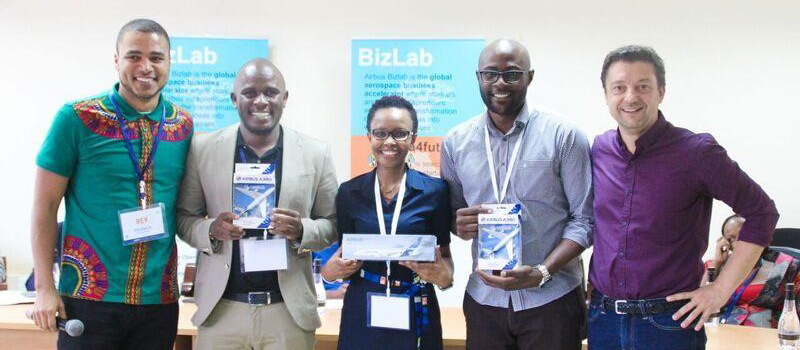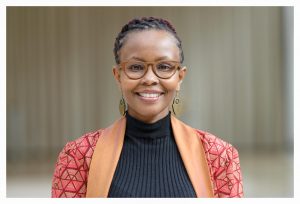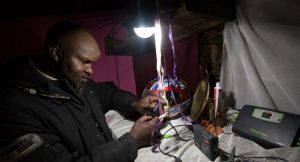
Juliana Rotich with winners of the Inaugural Airbus BizLab Pitch Event in Nairobi, Kenya.
Maybe, just maybe, a new entrepreneurial revolution is gathering. It’s a revolution fuelled by the arrival of Internet and mobile technology. But it’s a revolution that is popping up in the most unlikely places, and mostly under the radar of business awareness. If a revolution it proves to be, Juliana Rotich will be one of its cheerleaders.
In between stints at MIT, the University of Missouri, and elsewhere in the U.S., Ms. Rotich is also an ICT entrepreneur herself in her home ground in the heart of east Africa in Nairobi, Kenya. Her own track record—as co-founder of an intriguing start-up, Ushahidi[i]—has propelled her to prominence, but more than that, she is fascinated by the entrepreneurial process itself.
She wants to push that process to see lives and communities changed. “I truly enjoy bringing people together to solve problems. Entrepreneur, facilitator, and collaborator is how I see myself.”
She summarises her personal mantra for the new entrepreneur in a simple tagline: make-fix-help. It’s a shorthand description for a philosophy that puts basic problem definition and solution through critical collaboration as a key part of the entrepreneurial thinking. In this, real problems intersect with real opportunities. It’s part of a nuanced–but practical–framework that asks basic questions of how we should facilitate entrepreneurial growth anywhere in the world.
Could Africa enjoy a new kind of high-tech renaissance? The continent may already be seeing a wave of entrepreneurs such as Dorcas Muthoni[ii], who has created major ICT and e-governance companies in east Africa and been inducted into the Internet Hall of Fame.
“The wonderful thing about living in Africa,” Ms. Rotich points out, “is that we don’t have a shortage of problems and with that, we don’t have a shortage of opportunities to solve those problems. There is just so much richness in the problems we have globally and there is so much richness in the types of solutions and the types of lessons that we could learn from each other.”
Given all of this, what should go into the new entrepreneurial framework? Juliana Rotich outlined her thinking process to the PTC in a recent conversation.

Juliana Rotich, Tech Entrepreneur, Strategic Advisor, and Co-Founder, BRCK
Think broadly
“For me, we need a broader construct of what entrepreneurship means,” she firmly states. She says she is heavily influenced by informal businesses such as kiosks and artisans in her native Kenya, arguing these demonstrate real business and market situations. “For me, these are entrepreneurs.”
The tech industry is all too often self-obsessed and divorced from real market behaviours, she argues. “If we are, we shut ourselves off from some of the lessons we could learn from the entrepreneurs down the street.”
Think about platforms before products
Platform thinking pervades her thoughts. “One of the biggest lessons from the advent of the Web is this idea that in developing platforms, you not only solve your problem but create a platform so that others can solve their problems,” she proposes.
But here–and it’s a theme pushing wide impact that recurs in her narrative–she adds, “I find that products are difficult to scale, but platforms can scale.” The concept of platforms has become a subject for considerable cutting-edge thinking amongst experts—Ms. Rotich points to the blog of JP Rangaswami[iii] as a particular inspiration—but it is clear that in practical terms, open source platforms on the Web have become particularly important here.
Look at key behaviours around you

Photo Credit Vodafone
We can learn lessons here, she suggests, particularly in the informal economy which is characterized by small chunks of goods and services.
Of significant relevance to the PTC community could be a thorough examination of how small denominations of [mobile] airtime have changed lives, and what the implications are for both communities and telecom providers.
Of huge profile in this area is the original M-PESA mobile finance offering started in Kenya but which has fundamentally affected how we see clever ideas outside the developed world. The ideas for M-PESA were motivated by observing Africans at the street level swapping mobile airtime as a proxy form of money over 15 years ago.[iv]
After a decade of growth, M-PESA-facilitated money transfer is now used by 30 million people in 10 countries. A network of nearly 300,000 agents alone mediated cash-to-mobile transactions and payments. An MIT study confirmed that the service made a dramatic impact on households, lifting over 190,000 of them out of extreme poverty in Kenya alone.[v]
She acknowledges it is an established story, but it has much further to run. “The small denomination pay-as-you-go model has really increased adoption of technology, particularly for mobile phones, ”she affirms. “But now in learning from informal markets…there are major new businesses extending the same model, in terms of both scale and impact, in a different way.”
The same model has created M-KOPA Solar[vi] to provide wide-scale deployment of household-level renewable energy supplies, off-grid. Avoiding the need for customers to pay upfront, “they have packaged it in a way that it becomes affordable.” She is clearly enthusiastic about this approach and calls the resultant impact—500,000 households in Kenya now served—as “incredible.”
M-KOPA Solar provides solar home systems on an affordable mobile money payment plan, with an initial $35 deposit, followed by 365 payments of 45 cents, leading to ultimate ownership. The company promises customers “a world-class solar home system,” with the capability to power lights, stoves, phone charging, and radio/TV sets. The company now claims world leadership in pay-as-you-go renewable energy supplier to off-grid homes.

Photo Credit Georgina Goodwin
These innovations are causing major socio-economic impact, she says. “There are millions of children all around Africa—the remote areas of PTC’s Pacific region, such as island communities, have the same problems—with no light to do homework by, or will suffer longer-term respiratory problems caused by black smoke from kerosene lamps.” M-KOPA has eliminated kerosene in customer households whilst at the same time providing a better, cheaper service, and supporting direct ICT access.
Critical to this model of the pay-as-you-go solution is a clear strategy to scale and to get into more households. “These markets are not glamorous,” she says, “but they are important.” She continues: “We should give them focus because they are the next big-growth markets in ICT industries which see saturation in developed countries.”
Find enabling partners
Alongside the issues of start-ups, development models remain too top-down, she concludes, and should be more agile and responsive. “We should be looking at [the idea of seeing growth as] a garden and not just in terms of the individual plants. This should take account of platform thinking and entrepreneurship,” she says. The M-KOPA case—in its collaboration with M-PESA—suggests start-ups could work in clever partnerships with telcos and cellcos on a much wider level (M-KOPA itself was co-founded by Nick Hughes, who was a prime mover behind M-PESA).
She remains optimistic that this transformed ecosystem will materialise. “Telecom and utility companies should now think of themselves as enablers and platforms,” she says. “I feel that is the frontier that will help to change society.” She continues: “In less than a decade, we’ve seen telecom companies start to think and communicate differently about the value they bring to society…they are starting to talk about collaboration, about working together, about values, about innovation.”
Learn the art of the pivot
Other parts of the framework will also need thinking about. Scaling is a problem in many projects, she admits. Where an idea fails, capital is indeed wasted; lessons need to be learned here, but good may come of it.
Allied to this is a development approach that is often stymied by working at the pilot-project level but getting no further. “So-called pilot-itis in technology projects remains a problem,” she admits. “Here the approach should seek to do an experiment with a plan to scale that keeps iteration and additional components in mind as needed. We should be looking at what environment are we creating for people to create solutions within that particular context.”
Equally, a failed approach may enable an entrepreneurial focus on what could work and provide growth beyond the early stage business. “So, here the entrepreneur must pivot,” she says. “Here, we have a bit of a difference between Africa and somewhere like Silicon Valley, although it’s never easy anywhere.” Ms. Rotich says this often means getting the business environment right with conducive regulatory approaches, talent flows, and seed capital funding to help entrepreneurs off the ground.
Typified by what she calls the art of the pivot, she says, is Kenya entrepreneur Ken Njoroge, who co-founded Cellulant[vii] with a credit card and an idea in 2004. Mr. Njoroge’s early business concept pivoted to become a mobile commerce company that now manages, delivers, and bills for digital content and commerce services. More recently, Cellulant has been awarded a major contract by the Nigerian government to run an e-mobile registration and validation system for subsidized fertilizer payments to the country’s farmers that has already had significant impact. Cellulant—now in eight countries—has a target to become a Fortune 500 player across Africa.
In a meshed world, think talent meets opportunity
There are other lessons to be learnt, and the disruption created by the Internet may signal future relationships and organizations. “I don’t think we are going back to hierarchical systems and ways of thinking. Mesh networks, such as rapid disaster relief networks after the Puerto Rico storms, show that decentralisation at many levels is here to stay.”

Photo Credit Safaricom
These approaches are working on more than just the network level. “You can call this by different names, but I interpret them to mean making equalization possible so that more people can plug in and therefore more people can figure out different permutations of adding value. I find that extremely powerful and as a vision for our future we should continue to look for ways for decentralization to have an impact and to empower people to have the tools.”
Her own major startup—Ushahidi—has been both innovative and effectively decentralized itself. Ushahidi is an open-source platform enabling crowdsourced reports from Web and mobile to become a coherent information service everyone can access. Ushahidi has seen international applications as diverse as election reporting and disaster relief in Kenya, New Zealand, Japan, and Haiti. Founded in 2007, Ushahidi can claim it was an anchor company that catalysed and led to BRCK, the hardware company, as well as iHub, plus other offshoots like Gearbox.co.ke.
Closer to home, she points to another emerging example, residing—perhaps improbably—in the far north of Kenya, a place regarded as marginalised even within the country. Lodwar, near Lake Turkana, is the location of Kenya’s most remote tech hub. It hosts a non-profit initiative called Learning Lions[viii] providing high-quality IT and media training services for local youth.
The remoteness of the initiative has proved to be no barrier to achievement. Ms. Rotich says she was “amazed” at the sophistication of projects developed driven by hackathons and other training at the center. Ideas that have emerged from students a matter of months after their training include using drones to deliver medicine to remote communities and some solutions to weather patterns on Lake Turkana for fishermen.
“Talent is universal, but opportunity is not,” concludes Juliana Rotich. The Lake Turkana initiative is a powerful reminder that there is talent in the most remote areas of the world, she says. “We ought to give the same opportunities [here] as we give in Nairobi, San Francisco, or London.”
There are some intriguing lessons to be learned in this experience. “No one in Nairobi would have come up with these ideas,” she points out, and returns to her earlier metaphor by way of explanation. “What we should be thinking about is how we are dealing with the garden in Turkana and the garden in Nairobi, compared with what have we learnt from the gardens in San Francisco and London, and that can help to tend this garden of opportunities, ideas, and problems.”
ICT-mediated entrepreneurship may, after all, be on the verge of giving Africa a much brighter future, touching millions in the process.
Juliana Rotich will be one of our highlight presenters at PTC’18 during the Monday Morning Keynotes on 22 January 2018.
Further reading
[i] http://www.ushahidi.com
[ii] https://internethalloffame.org/inductees/dorcas-muthoni
[iii] http://confusedofcalcutta.com [the blog of JP Rangaswami which discusses many ideas of platform thinking]
[iv] http://www.vodafone.com/content/index/what/technology-blog/m-pesa-created.htm
[v] http://news.mit.edu/2016/mobile-money-kenyans-out-poverty-1208
[vii] http://www.cellulant.org







